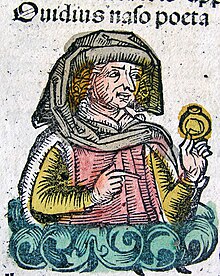When it comes to sizing up influence upon the modern world, few classical authors can rival Ovid (Publius Ovidius Naso, 43 B.C. – A.D. 17.). Born to a wealthy municipal family at Sulmo in the Abruzzo region, Ovid tells us that he shunned the opportunity of pursuing a senatorial career in imperial Rome, preferring instead the life of the poet. His three books of pseudo-autobiographical erotic elegy, the Amores, and his Ars Amatoria (a self-help poem written for the prospective Casanova and his consort) make Ovid perhaps best known today as a love poet. His oeuvre, however, ranges far more broadly than this. In tandem with his collection of letters from the heroines of Greek legend (the Heroides), Ovid’s highly unorthodox and brilliant epic poem, the Metamorphoses, forms the basis of a great deal of our modern retellings of the ancient mythology. His contribution to our understanding of Roman religion is similarly unmatched, having written the book (or at least half of it…) on Roman festivals in the Fasti. One final twist awaited Ovid’s literary career. Exiled to Tomis on the Black Sea by the emperor Augustus for some unspecified indiscretion in 8 A.D., Ovid transformed himself into a dissident voice through his plangent Tristia, Ibis and Epistulae ex Ponto. Hoping for a recall to Rome, Ovid continued to write these works until his death nine years later, far from his native Italy.
Andrew Sillett, PhD student, Brasenose College, Oxford

Heroides | Amores
Medicamina Faciei Femineae
Ars Amatoria | Remedia Amoris
Metamorphoses | Fasti | Ibis | Tristia
Metamorphoses
Metamorphoses 1.525-58 | Apollo and Daphne
Contributed by Anne Dicks
Metamorphoses 3.368-99 | Echo and Narcissus
Contributed by Rachel Carter
Tristia
Tristia 3.7.31-54 | Old age, art and the limits of human endeavour
Contributed by Andrew James Sillett